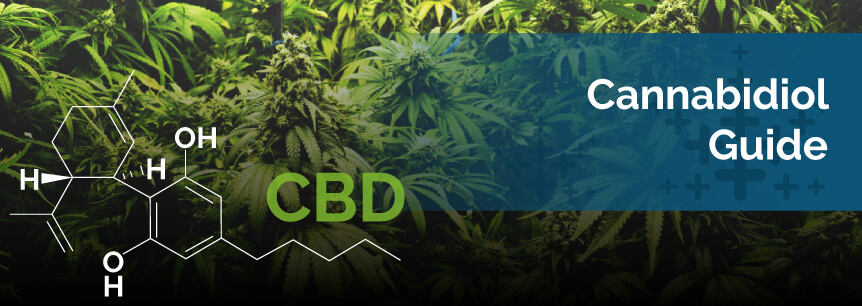
If you’re suffering from a chronic health condition that’s negatively impacting your life, it’s likely you’ve heard the buzz about cannabidiol, or CBD for short. In fact, this compound is rapidly changing the debate that surrounds using cannabis as a medicine.
You probably already know about THC, which is the substance in marijuana that gets you high. However, CBD doesn’t cause the same euphoric effect that THC does, and there’s growing evidence to suggest that it has many medical benefits.
CBD is often stigmatized, as it’s easy for people to mistake it for THC. This is understandable as there can be a great deal of confusing terminology surrounding cannabidiol, THC and marijuana in general. In this article, we look at what CBD is as well as its legalities and the medical uses of cannabidiol. Read on to get the lowdown on what could be a very important substance for medicinal use.


This work is licensed under a Creative Commons Attribution-NoDerivs 3.0 United States License. If you like our infographic, feel free to share it on your site as long as you include a link back to this post to credit Marijuana Doctors as the original creator of the graphic.
CBD is a non-psychoactive chemical compound found in cannabis and hemp plants that provides therapeutic benefits without a ‘high’ feeling. CBD is just one of more than 400 compounds found in the plant and is a cannabinoid in high concentrations.
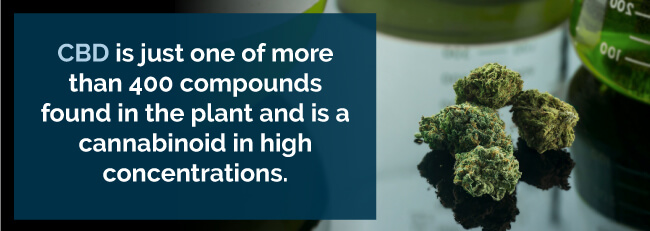
Cannabinoids actively bind to special receptors on your cells and are part of what is known as your endocannabinoid system. This is a huge network of cell receptor proteins that have a vast array of functions. Some receptors are found within your central nervous system, whereas others are found in other places, such as your reproductive organs, skin and digestive tract.
This system is responsible for controlling your mood, appetite, sleep, immune response, movement, sperm development, ovulation and cognition.
Found in the flowers, stalks and seeds of the marijuana and hemp varieties of the cannabis plant, CBD is a naturally occurring and plentiful substance, and can be easily extracted from the plant. It’s also possible to produce cannabidiol synthetically in a lab.
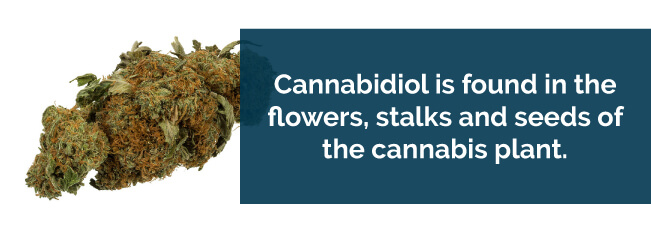
Medical plants are cultivated to be high in CBD and are sold to licensed dispensaries, then prescribed to you by doctors in states that have regulations in place. Bear in mind medical marijuana isn’t legal everywhere in America, and you need to be living in a certain state to get a prescription.
The FDA considers hemp oil and the CBD derived from it to be a dietary supplement rather than a medication, so you can legally buy and take CBD in any state throughout the U.S. An added benefit of industrial hemp-derived cannabidiol is it contains almost no THC, so there is no risk of getting high.
In terms of treating medical conditions, the majority of patients are turning to more natural medicines. As CBD is extracted from plants and has been used medicinally for thousands of years, it stands to reason its properties should be explored further.
CBD has been shown to boost many functions of our own cannabinoid receptors, and the indirect nature of the substance’s effects has made it difficult for scientists to fully understand. What is known is CBD could potentially have dozens if not hundreds of therapeutic applications in the future.
CBD is an antipsychotic and how it exactly works is unclear at this time. What is known is CBD seems to stop the breaking down in the brain of a chemical that affects mental function, mood and pain. It’s also thought CBD may effectively block out many of the psychoactive effects of THC, as well as curb anxiety and pain.
As CBD is non-psychoactive, it won’t get you stoned in the manner that THC does. In fact, due to the psychoactive effects of marijuana, CBD was overlooked for many years.
Again, research is the most important way we have of understanding CBD as it’s a very complicated compound. This is because it’s polypharmacological, meaning that it affects various aspects of your body at one time. It’s therefore crucial to know how these different changes interact, and this can only be discovered through clinical research.
CBD activates receptors like serotonin, adenosine and vanilloid receptors, which have the following functions:
Your body produces its own compounds that are similar to those found in cannabis. These are known as endocannabinoids, and CBD regulates these, too. It works by blocking the fatty acid called FAAH that’s responsible for breaking down your body’s natural endocannabinoid anandamide.
Anandamide regulates many of your basic functions, like sleep, pain, reward, pleasure and more. As the FAAH is blocked from breaking down the anandamide into smaller parts, CBD boosts this chemical within your body. Furthermore, CBD connects with the receptors in your body that are responsible for regulating your body temperature and immunity, actively reducing inflammation.
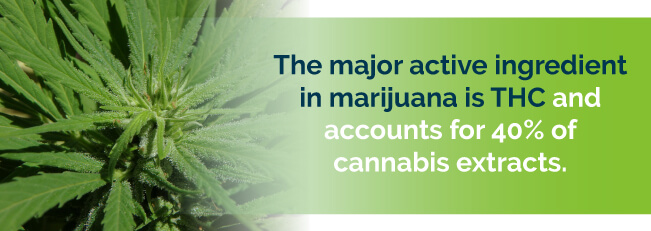
Although the major active ingredient in marijuana is THC and accounts for 40 percent of cannabis extracts, it’s no wonder cannabidiol is now being studied as a new drug. CBD is one of the most exciting cannabinoids as it’s becoming increasingly known for its potential uses in treating illnesses.
There is exciting research coming out that points to CBD being effective for a wide range of conditions and disorders. According to research published in the British Journal of Clinical Pharmacology, CBD can act as an:
In addition to the above, there is currently a prescription-only nasal spray, Sativex, that contains both CBD and THC, and has been proven effective in terms of treating frequent urination, muscle tightness and pain in MS sufferers.
Research also suggests using a CBD spray under the tongue may tackle pain as well as muscle tightness.
There is so much to be said about the therapeutic value of CBD, and it’s believed by many that it could soon become one of the most useful medicines ever found.
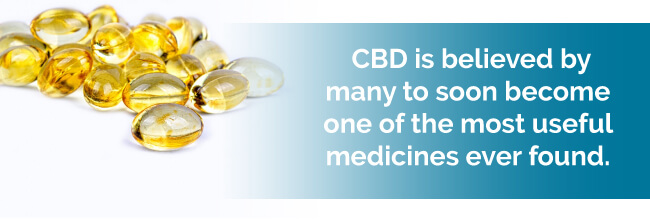
Although rigorous clinical testing and studies are needed to fully evaluate the clinical potential of cannabidiol for specific illnesses, preclinical research shows there are a range of therapeutically useful effects derived from taking CBD as a medicine. There are different ways to use CBD, depending on what you are treating.
With the huge upsurge in demand for CBD, as more people understand the amazing health-enhancing potential of the substance, many are searching for alternative sources of cannabidiol.
CBD is found in hemp, which is legal, and because of this, the demand for CBD hemp oil topicals and supplements has vastly increased recently.
If you’re considering taking CBD, it’s natural to wonder about the side effects, especially as it’s derived from the cannabis plant. As stated previously, cannabidiol is not psychoactive and won’t produce any high.
Side effects of CBD Include:
Taking the side effects into account, CBD has been used safely for as long as six months at a dose of up to 300 mg a day. Daily doses of between 1200 and 1500 mg have been proven safe for up to four weeks, and under-tongue sprays have been safely used in 2.5 mg doses for up to two weeks without issues.
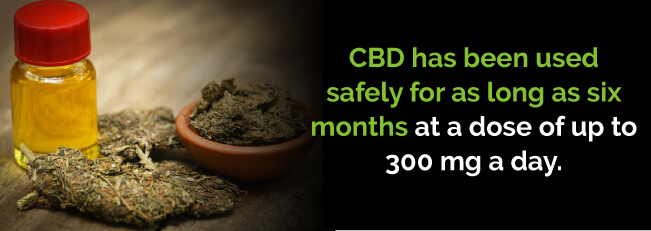
CBD is a safe medicine to take, generally speaking, as a review of 25 studies concluded that there are no significant side effects no matter the method of administration and dosage. Especially products using pure CBD, which should not contain any THC, have few negative side effects for patients.
However, special precautions should be taken if you’re breastfeeding or pregnant, as there hasn’t yet been enough research into the safety of CBD within this group. Also, if you suffer from Parkinson’s disease, you should consult a doctor before exploring CBD treatment as high doses can make the symptoms of some people with the condition worsen.
So, now you know more about CBD, let’s highlight some of the most important facts you need to know.
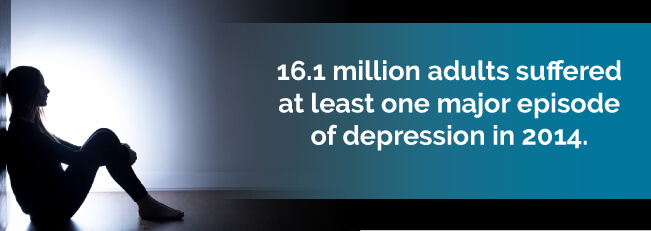
As research continues, there are sure to be many added benefits of cannabidiol that we don’t yet know about.
On December 14, 2016, the Drug Enforcement Administration (DEA) delivered a new ruling that classifies CBD oil as a Schedule 1 drug, making it illegal under federal law. With that said, the Rohrabacher-Farr amendment, limits the Justice Department (and DEA) from overriding state medical marijuana laws. This means that while the DEA considers cannabidiol illegal, if your state allows patient access to medical marijuana you are still able to possess cannabidiol oil (if it doesn’t contain psychoactive THC). Therefore, if you wish to benefit from CBD, it’s critical that you know your state’s laws, partner with trusted marijuana doctors, possess a medical marijuana card and have a valid medical marijuana prescription.
Even though CBD is non-psychoactive, it’s still illegal if it comes from a medical marijuana plant and you don’t have a prescription. Generally, most high CBD strains are illegal and if a product contains more than around one percent THC, it’s currently classed as a psychoactive Schedule 1 drug and therefore illegal.
All substances, drugs and some chemicals used to create certain drugs are put into one of five distinct categories based on their dependency or abuse potential as well as their acceptable medical uses. All plant cannabinoids are classified as Schedule 1 drugs, which means they have a high potential for abuse as well as the potential to create severe psychological/physical dependence. They’re also defined as having no currently accepted medical use.
Without reclassification or legalization, federal restrictions on cannabis stop sufficient research into the health benefits of CBD. It’s clear more in-depth research is needed as soon as possible.
However, the U.S. Food and Drug Administration (FDA) recently approved a request by GW Pharmaceuticals to trial a children’s drug named Epidiolex, which is a pharmaceutical version of CBD. The same company already makes the cannabis-based Sativex that’s approved in many countries as a treatment for multiple sclerosis. Epidiolex contains no THC, and over 98 percent CBD and could pave the way in terms of future CBD-based drug trials.
CBD negates many of the psychoactive properties of THC by blocking some receptors in your brain so THC won’t affect them.
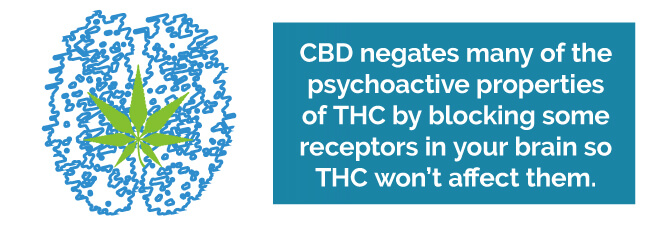
Another difference between these two cannabinoids is when people smoking dope speak of having “the munchies” and getting extremely hungry after a smoking session, it’s THC that’s to blame. Conversely, studies in rats have shown that CBD has the completely opposite effect, making them feel more satisfied with their food and also less hungry.
If you’re considering cannabidiol therapy or treatment for a medical condition, you can search here for a licensed medical marijuana doctor for an evaluation and recommendation on a dispensary and check out our CBD Resources.
Cannabidiol has many positive effects for patients looking for treatment without mood-altering effects. Learn how CBD can be used to treat common conditions: